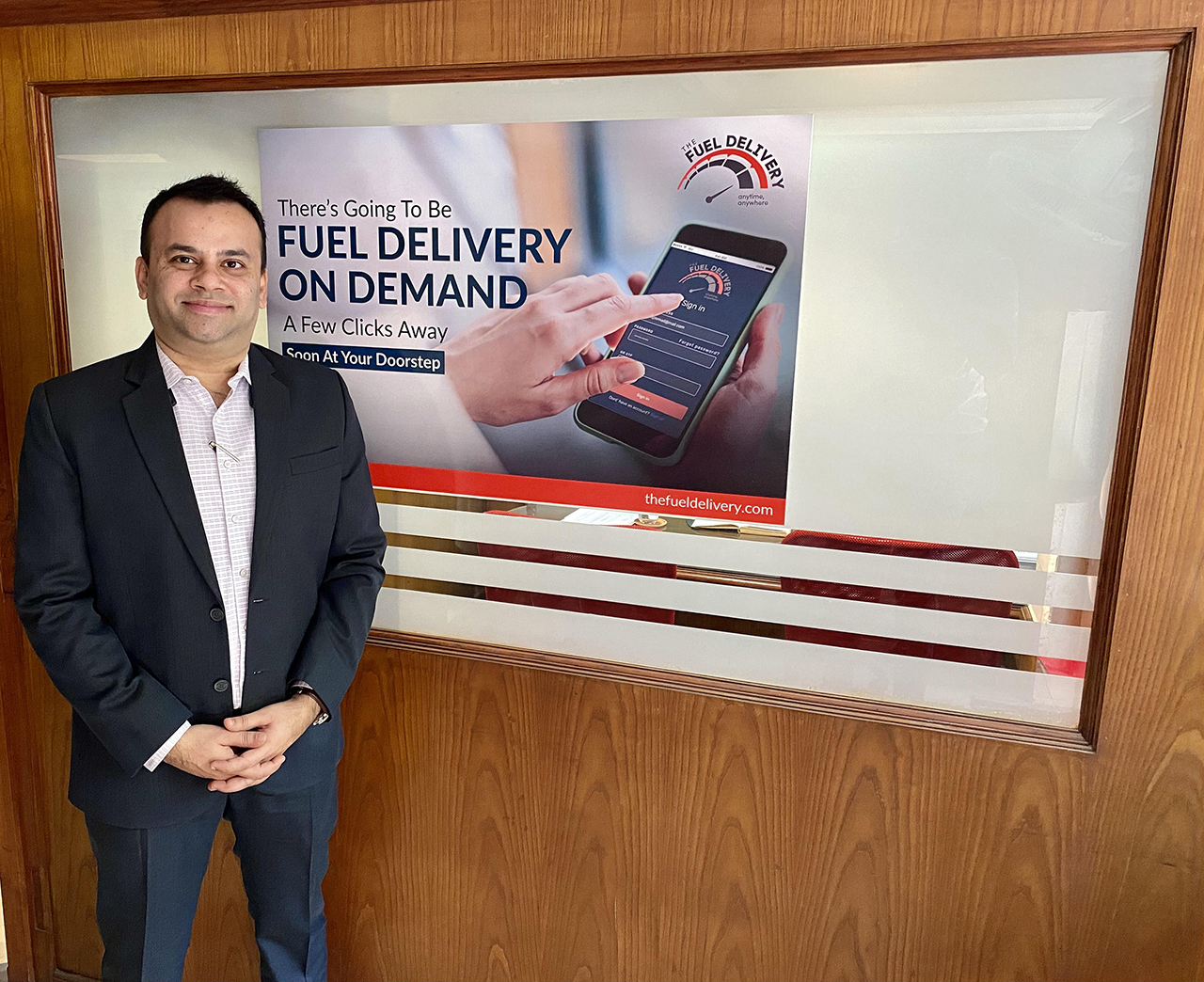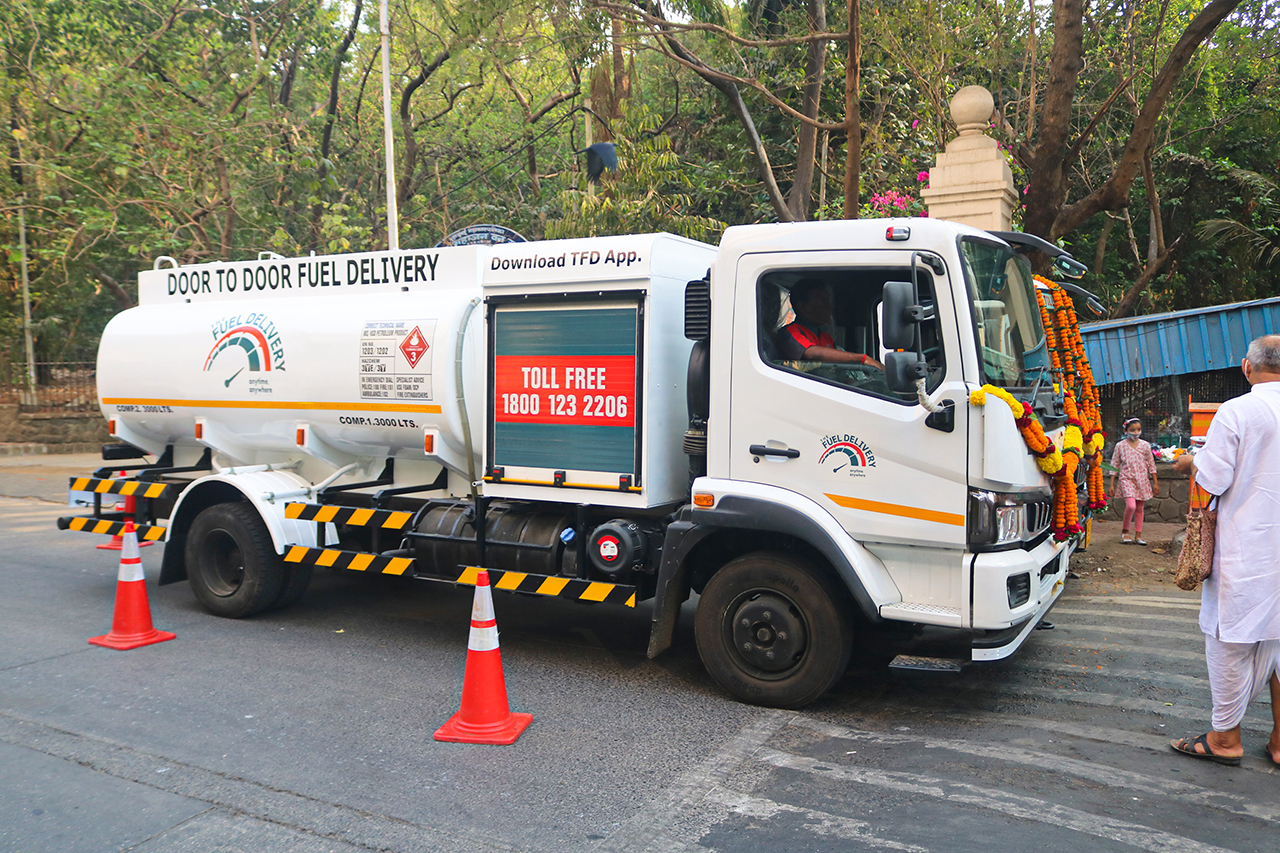The demand for home delivery has increased significantly over the years, more so during the last 15 months of the pandemic. People’s preferences are shifting toward online shopping as more technological innovations enter the picture. Rajesh Rajgor spoke to Rakshit Mathur, Founder and CEO, The Fuel Delivery, a provider of door-to-door fuel delivery via an app and the value the company adds with such an initiative in this tightly regulated space

By including a provision in the Delhi Excise (Amendment) Rules, 2021, the Delhi government recently authorised home delivery of alcohol via web portals and mobile apps. The decision raised many eyebrows but is a stark reminder of the proliferation of home delivery services, more so in the pandemic times. Doorstep deliveries have witnessed a growth in various product segments, from food, furniture to garments and liquor and many of these service providers are offering quality and guaranteed timely deliveries through apps. This propelled the idea of ‘The Fuel Delivery’ that offers door-to-door fuel delivery for B2B service providers.
The company announced the formal launch of its Mumbai operations last month after starting its services in Delhi NCR a month before. Speaking exclusively to MOTORINDIA, Founder and CEO, Rakshit Mathur says, “The idea of The Fuel Delivery had long been on my mind. If we can get almost everything at our doorstep, why not fuel? As we researched and worked on this idea, we realised in India it would not be possible to do it for direct (B2C) customers as yet, but would certainly be feasible to serve industries such as real estate (both under construction and occupied projects), hospitals, corporate office parks, schools and institutions, banks, shopping malls, warehouses and agriculture machineries at their sites, often far away from the fuel pumps.”
According to the company, it has recently signed an all-India business agreement with Indian Oil Corporation (IOCL), a state-owned oil company. The service level agreement enables The Fuel Delivery to provide diesel delivery to customers’ doorsteps throughout India. To facilitate this, the company has deployed six vehicles, as of last month, while an additional four vehicles are in the development stage. “We have identified orders worth more than 1,00,000 litres per month per bowser (tanker) in places like Mumbai and Delhi. We have a set of customers and a MoU in place, and when we do the consolidated numbers, we see that with three bowsers on the Mumbai roads today, we can deliver approximately 3,00,000 litres per month in the city alone,” he says.
Solving a Problem
Apart from arranging loyal workers at under-construction sites, one of the biggest challenges for a construction firm is to procure fuel for their big machines on sites. Mathur and the team of The fuel Delivery, while doing initial research, observed that there was a certain level of logistical challenge to get fuel at these sites. Mathur explains: “Once the idea of delivering fuel with an online, app-based methodology was firmed, we decided to explore the potential of the clients. There are various live sites going on in and around Mumbai. We stopped by to speak to the site contractors and understood how they procured diesel for their machines.”
“Mostly a site manager will send a worker with a canister to a nearby fuel pump. He will be paid for the to and fro journey. The worker also has to wait at the pump for his turn, causing waste of time. Additionally, once the fuel is being poured manually there is some spillage. While it is a loss of fuel, it can also lead to an accident. We wanted to address these difficulties and enable the owner with a choice to order fuel at his doorstep,” he adds. The company has carefully picked up two fabricators, one from Mumbai and another from Delhi, who design fuel bowsers and assist in dispensing units as per the Petroleum and Explosives Safety Organisation (PESO) norms. According to the company, it is leveraging the potential of IoT (Internet of Things) for the development and deployment of the mobile app as well as the fuel bowsers. All delivery vehicles are outfitted with an IoT solution that allows for real-time monitoring and tracking, as well as better logistics management by reducing order fulfilment time.

Elaborates Mathur: “We have embedded sensors in the tankers that communicate with our dispensing unit. Even if a single drop of fuel is dropped we get the notification in real-time. It gives us an accurate understanding of the location – whether it is the customer’s place or is it happening anywhere else. Additionally, we are using RFID tags at the opening of the machines to track correct delivery. Only if the RFID at the nozzle reads that it is the correct tank, it allows the dispensing to start. Each of our dispensing unit adheres to the PESO standards and is also fitted with a flow meter to notify accurate statistics of the flowing fuel.”
Enabling Users
A customer can order diesel using his or her mobile or web app and the company’s bowser will deliver it. The customer just has to download the app, log in and punch in the requirement, quantity of fuel required or the amount for which they would like to fill the tank, place the order and pay online as per the invoice billed. The delivery can be tracked on a real-time basis until delivered. From 100 litres to 6,000 litres, capacity is not a constraint. The long-term goal and vision for The Fuel Delivery is to work towards making fuel available for retail B2C customers. The concept will require some deliberations at the policy level and hence a few law amendments and technical prowess to avoid any mishap.
“Many international locations such as Dubai are already dealing in door-to-door B2C clients. If a city with high temperature like Dubai can do it, why can’t we? There exist safer technologies that can ensure there is low risk and if that can be brought to India, hopefully we will have a big market to cater to,” Mathur points out. According to industry standards, door-to-door fuel delivery is approximately 70,000-80,000 litres per month per bowser. The door-to-door fuel market is expected to be worth more than Rs 2,000 crore in the next 12-18 months, according to oil marketing companies.
Nevertheless, given the current set-up, the company is looking at further expansion in cities like Pune, Chennai, Hyderabad and Bangalore. “As of now we have commissioned orders for 10 trucks which are 3 KL bowsers built on Eicher trucks and 6 KL bowsers built on Mahindra and Mahindra trucks. We will be ready with a total of 75 trucks by the end of next year,” Mathur reveals. Even though the concept of app-based fuel delivery is at an evolutionary stage in India, there is ample scope here for each stakeholder to benefit from. A revision of regulations might be on the cards, which would certainly benefit early movers like The Fuel Delivery in this doorstep delivery segment.